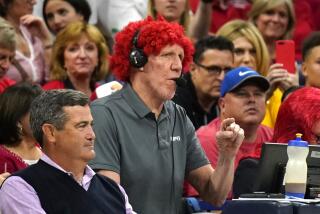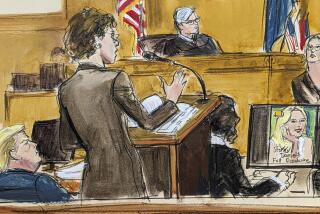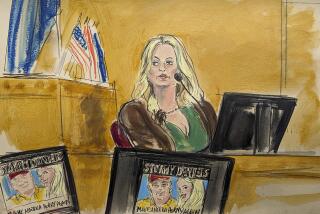Ethics Tied to Gift to CS San Marcos
- Share via
When cable television king Bill Daniels donated $250,000 to Cal State San Marcos, those who know him say he was just being true to his form as a champion of philanthropy and ethics.
Consider the story of the Utah Stars basketball team.
When the Stars declared bankruptcy in 1976, it left behind hundreds of disgruntled season ticket holders with worthless stubs.
Vendors who had set up shop to cater to the team were also hung out to dry.
The scenario was repeated in cities such as San Diego, Memphis and Louisville where American Basketball Assn. franchises folded up in 1976 when the league became defunct.
The difference in Salt Lake City, however, was that Daniels owned the Stars, and he was not one to leave others holding the bag.
More than four years after the Stars went under, Daniels returned to Salt Lake City and repaid the ticket holders and the vendors what they had invested in the team--plus interest.
Daniels had already lost $4 million in the Stars, and the added payouts, which he did not have to make, cost him an additional $750,000.
“I could remember having tears in my eyes because . . . he didn’t have to come back to Salt Lake for the rest of his life if he didn’t want to,” said John Mooney, sports editor of the Salt Lake Tribune, who attended the press conference where Daniels announced that he was paying back the fans.
Daniels made his fortune in the cable television industry, having brought the first television picture ever seen in Wyoming through a microwave relay from Denver in 1953, and he has been called “the father of cable television” after introducing the concept to the West Coast.
He owns a majority interest in Daniels & Associates, a cable brokerage firm, and Prime Ticket Network, the largest regional sports network in the nation.
The part-time Del Mar resident’s most recent bit of philanthropy reflects that background--$250,000 to endow a chair in communications at Cal State San Marcos.
That’s just the beginning of what could be a longstanding relationship between the fledgling university and a man who wants to see the study of communications brought to a higher level.
Daniels already has charged the president of Daniels Cablevision in Carlsbad, Tony Acone, with the task of raising money from local businesses to enhance a future communications program at the university.
“There are two things you look for in university development: a person with an interest in giving and the means to do it, and he’s demonstrated both,” said Bill Stacy, president of Cal State San Marcos.
Stacy said the shape of the communications department has yet to be decided by the faculty and the university does not plan to fill the communications chair endowed by Daniels until at least the fall of 1992.
The 70-year-old pioneer of the cable industry has also given $10 million to the University of Denver, where he has one of his several homes, to restructure their master’s of business administration program to include programs in ethics and real-world business.
“He really stands for what we stand for--as opposed to the Trumps, Boeskys and Milkens of the world who are bankrupt both morally and financially--and Bill Daniels is the kind of person that we would like our students to be like,” said Dan Ritchie, chancellor of the University of Denver.
People who have done business with him praise him as “a visionary” and a true entrepreneur.
“Bill swings from the ankles,” said John Malone, president of Tele-Communications Inc., for whom Daniels & Associates has brokered several cable television station purchases. “He’s not risk-averse. He’s willing to make substantial risks for substantial rewards.”
Daniels, who never went to a four-year college, gets similar praise from his competitors.
“He’s a living legend in the cable business. You’d be hard-pressed to find any detractors of him because he is one of the best-liked in the business,” said Rick Michaels, chairman and chief executive officer of Communications Equity Associates, Daniels’ main competitor in the cable brokerage industry.
“As far as the brokerage business goes, he is the king of the deal people, and I’m pleased to follow behind him,” Michaels said.
The impact of Daniels’ gift on the University of Denver goes beyond the $10 million in matching funds.
“Daniels’ major contribution was in his vision, the notion that values and ethics need to be integrated in the total curriculum,” said Bruce Hutton, dean of the university’s business school, which has 650 MBA students.
Daniels credits business schools with developing energetic minds, but feels that they teach from the textbook too much and not enough from reality.
“In our company, most of the young people we hire are MBAs,” Daniels said. “They’re young and they have a high energy quotient and they want to go out and conquer the world, and technically they are well schooled to do it. But they are not schooled at what goes on in the real world of business.”
Daniels said that MBA graduates today fail to take such simple steps as promptly returning phone calls or answering correspondence.
“Some of their manners are terrible, and they don’t know how to treat the people in their company with respect, with kindness,” Daniels said. “They know nothing about giving back to the community within which they are going to live and work.”
The University of Denver’s revamped MBA program, which was fully implemented this fall, includes seminars on professional manners, cultural sensitivity, managerial ethics, and creativity.
There are also required three-day survival training sessions to encourage team building and creative problem solving, as well as volunteer programs designed to increase students’ sense of social responsibility.
Daniels not only preaches it, he lives it through his company’s own spirit of giving back to the community, his admirers say.
His 25,000-square-foot home in Denver is often given over to local charities to conduct fund-raisers. His home, appropriately named Cableland, has 98 television sets and 104 telephones.
Daniels also spent $2 million to create The Kids Bank in Denver, a bank designed to teach children fiscal responsibility, not with mock money but with real dollars.
Daniels is taking a wait-and-see approach to Cal State San Marcos and has no immediate plans to get further involved in the university.
“I think I’ve done all that I’m going to do for now, but as I watch the developments and get more acquainted with some of the people, I might do something more,” Daniels said.
Daniels does not have a specific vision for what a program in communications should teach, but does want to make sure that ethics is a part of it.
Daniels also feels that higher education doesn’t focus on the impact of cable television enough, despite its increasing presence.
“I’m not so sure that the universities today do a good job of teaching anything about cable television,” said Daniels, although he proposes no specific curriculum in cable television.
“We are the fastest-growing arm of the communications business today. But most people think that if you go to school to take communications, you’re going to get into radio or broadcast television. Come on, it’s a different world now, and I would hope that Cal State San Marcos will touch on all the things that are part of the communications world.”
Daniels first entered the cable business in 1952 after he walked into a Denver bar off a dusty street and got his first glimpse of television that was showing his favorite sport: boxing.
Daniels was in the insurance business at the time, but a year later he set up a microwave relay system to bring the first television picture to Wyoming.
“That was the first TV picture of any sort that was seen in Wyoming,” said Gene Schneider, who began the project with Daniels.
“In those days, there were 22,000 people in Caspar, and we got close to 4,000 homes hooked up to television by the end of 1954,” said Schneider, who now chairs United Artists Entertainment in Denver.
“Television in those days was a tremendous novelty. The quality of TV and the picture is not even close to what it is today, but still people just loved it, and it became a very marketable product even though we had only one channel,” Schneider said.
Daniels’ own firm has extended itself into just about every aspect of the communications field, from cable television to mobile phones to pagers. His company plans further ventures into the home alarm system, just another part of Daniels’ “communications world.”
But sports is his first love, and Daniels’ fiasco with the basketball business didn’t scare him off. He is now one of three minority owners of the Los Angeles Lakers.
More to Read
Go beyond the scoreboard
Get the latest on L.A.'s teams in the daily Sports Report newsletter.
You may occasionally receive promotional content from the Los Angeles Times.










